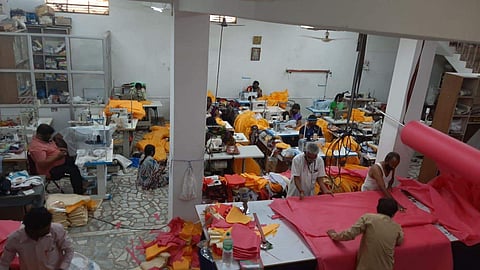COVID-19: This Gadag doctor's PPE kits are impermeable to blood, urine and serum
When Dr Pavan Patil from Gadag watched the news about shortage of Personal Protective Equipment Kit (PPE), all he did was browsed on the internet to know how these PPE kits are manufactured. It took only two days for him to decide on what kind of material he must use to make these kits and what actions they must take to save health officiaks from coming in contact with COVID-19.
He says, "Doctors in Gadag District are a very closely-knit community and we have always tried to help government and the marginalised during all kinds of crisis. This time, we thought that we must be contributing in our own way. That's why I thought to manufacture thousands of PPE kits for doctors."
Initially, Dr Pavan and his friends thought that they must buy a huge number of raincoats as it is made of plastic and can cover a person from head to toe. It can be washed in water with chemicals and reused again. But then, there was some reluctance among doctors to use rain-coats. That's when he read different research articles on the internet to find out what is the exact material used in making these kits. "Usually, we get these gowns for doctors to be worn during surgeries. And they are made of spun-bound plastic. Hence, the next day, I contacted my family friend who has been in the garments industry for a long time now. I asked him if it was possible to use this particular material to manufacture the PPE kit. He readily agreed to it and found out that this material was available in Hubballi. On the same day, I arranged an ambulance from our hospital to go all the way to Hubballi. It took one and a half hour for me to reach Hubballi. I got this spun bound material which is a combination of polyester and polypropylene. We knew that it was a non-woven fabric and water-resistant material. The material comes in different thickness level and the health care system is advised to use 50 to 60 gsm thickness material," explains Dr Pavan who is proud of his contributions to the health sector.
The team stitched a few samples and asked one of their health staff to try it out. There were some corrections to be made and designed accordingly to bring out the final product. Now, the main challenge was to get this material tested according to the ISO standards whether it is impermeable to body fluids like blood, urine and serum. Pavan says, "Since there was is no testing mechanism in Karnataka, we sent the stitched sample to Coimbatore. Meanwhile, we tested the material by pouring blood, urine and serum on it. We waited for two hours to check if the material is impermeable. We found out easily that it was not entering the other side of the spun bound material."
A person wearing finished product of PPE kit
It was time for him to study the ISO-16603 standards to qualify their tests in terms of PPE kit. According to the standards, this material should be impermeable even under the pressure or heat. It must be tested using a particular machine. Therefore, Pavan contacted a nuts and bolt industry. "They were so helpful and they designed a machine to test this PPE kit. We took the material and tested it and the results were clear. Any of these components cannot penetrate into the PPE kit. Therefore, we have continued stitching PPE kit. Every day, we have been stitching 200 to 300 PPE kits with the help of 20 dedicated tailors."
The cost of the kit that Pavan has been manufacturing is Rs 600 which otherwise is available at Rs 900 to Rs 1,200. Apart from this, his hospital staff have been producing material to cover the legs as well. "We stitch the thick plastic cover using elastic and it can be worn just like socks that we wear. Their PPE Kit comes along with googles which are used by patients after their cataract surgery. Since the stock of these googles is also low, we have prepared the hood of PPE kit in such a way that it covers your face. What we have decided is as far as vendors provide us with the PPE kits, we will use them. The kits that we are stitching will be our last resort and it does not matter to me even if we incur a loss. All that matters is we need to have enough stock with us during the time of crisis. We have read news reports that countries like USA and UK are also exhausted with PPE kits. Therefore, we must be prepared to provide this to our doctors. It's very sad that the doctors are forced to use plastic aprons due to the shortage and it has led them to come in contact with the virus."
Yesterday, Pavan and his team have received four tonnes of spun bound material from Rajkot. "We are only awaiting the certification from the government. If our PPE kits qualify their standards, then we can enhance the production and provide more of these kits," he concludes.



